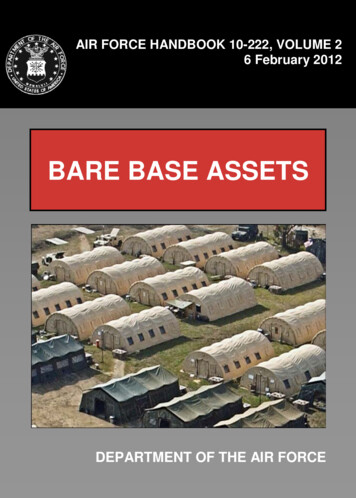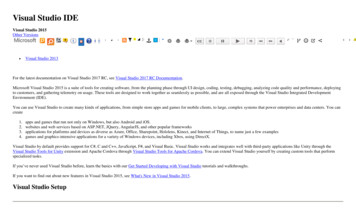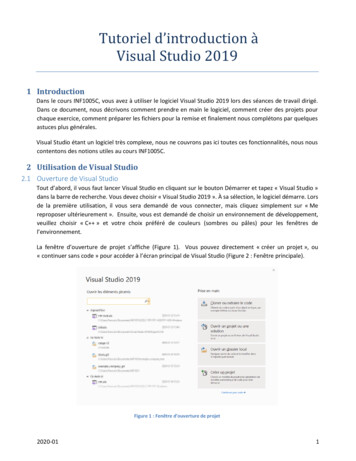
Transcription
The Expeditionary TimesProudly serving the finest Expeditionary service members throughout IraqVol. 4 Issue 21October 6, 2010www.armyreserve.army.mil/103rdESCVIPGen. Dunwoodyvisits JBBPage 4Live MusicU.S. Army photo by Sgt. Jessica RohrIraqi boys and girls enter the Red Tail Morale, Welfare and Recreation center as service members cheer for them during Iraqi Kids Day Sept. 25 atJoint Base Balad, Iraq. The event drew a crowd of more than 120 Iraqi children, many of whom came from an orphanage in the Duluiyah province.The day’s events included playing with water balloons, swimming, musical chairs, soccer, and more.Iraqi Kids Day activities draw crowdCatchpenny toursIraq for tenth timePage 7Fight NightTroops train hardfor victoryPage 10Story bySgt. Jessica RohrExpeditionary Times StaffJOINT BASE BALAD, Iraq—More than 120Iraqi children,rangingfromfive to 12 yearsof age, took overthe Red TailMorale, Welfareand Recreation center during IraqiKids Day Sept. 25 at Joint BaseBalad, Iraq.Iraqi Kids Day is a collaborative effort of U.S. military servicemembers and civilians on base tocreate an avenue for local outreach.The outreach fosters good relationships in the communities surroundingJBB by allowing the children fromlocal communities the opportunityto interact with U.S. forces in a safeand entertaining environment.Of the 120 children, many ofthem came from the orphanage inDuluiyah, Iraq, giving them a welldeserved day of stimulating fun andplay time.The girls entered the building tocheer and laughter while they werepaired with female service membersas their mentors. The boys followed,receiving their own welcoming roarof applause, as they too were pairedup with male service members forthe day’s events.“I thought it would be a greatopportunity for me to partake in, tohelp show the Iraqi kids that we aretrying to make a difference in theirTouching photos capture Iraqi childrenplaying and connecting with servicemembers during Iraqi Kids Day at JBBPage 8lives,” said Spc. Stacey Hunnell,force generation plans specialist withthe 103rd Sustainment Command(Expeditionary), and a Des Moines,Iowa, native. “It lets [Iraqi children]see that the U.S. military isn't bad.They got to get out and have funfor a day. Not all of them have thatopportunity.”The day was filled with manyactivities for everyone to enjoy.Activities included tossing waterballoons, swimming in a small,outdoor pool, musical chairs, soccer,the Guitar Hero videogame, and amagic show.The children especially loved todance as service members taughtthem some American moves; thechildren also enjoyed the photobooth, where they received a print-out to take home in remembrance oftheir special day.During this month’s Iraqi KidsDay, Hallmark Cards sponsored aspecial station: “Kaleidoscope,” anart experience for all ages.Hallmark’s Kaleidoscope kitsallowed the children to let theircreativity flow. The kits provided ahands-on art experience, filled withcoloring paper, crayons, markets,stickers, and more.“I was actually asked by myplant manager in Topeka, Mr. TonyFrohaska, about what they could doto help out,” said Col. Ken Jones,deputy commanding officer of the103rd ESC, and a Berryton, Kan.,native, who works for Hallmark.KIDS DAY cont. page 8
Page 2Expeditionary TimesWhere do you read yourExpeditionaryTimes?Joint Base Balad :318-483-4603COB Adder:318-833-1002COB Taji:318-834-1281Al Asad Air Base:318-440-4103COB Speicher:318-849-2501For distribution, contactthe 103rd ESC PAO atJoint Base Balad, Iraqe-mail: escpao@iraq.centcom.milAll people are connectedLt. Col. Paul Dirksmeyer402nd AFSB ChaplainIt’s called the “Six Degrees of Separation.” It’s a theory stating that,through social networking and personalacquaintances, anyone—anyone atall—is only six degrees or “steps” awayfrom anyone else in the civilized world.In other words, if you start talking to a completestranger and share some personal information with eachother, through the networking of a series of acquaintances you and the stranger will discover that you havea connection through five people or fewer.Some claim such a theory is utter nonsense andnothing more than urban legend. Personally I’m notso sure. I’ve had several episodes where the “stranger”with whom I’m speaking on a plane or in an airportand I realize we have some kind of connection throughfriends of friends of friends and so forth. I’ve neverreally counted the steps but I wouldn’t be surprised if itoccurred in fewer than five.Case in point: an experience I had recently whilewaiting for a flight at the helicopter pad in VictoryBase Camp, Baghdad. I struck up a conversation witha civilian contractor around my age also waiting for aflight. I asked him the usual questions: How long haveyou been here? What do you do? Where are you from?He told me he was from the upper Midwest but grewup and graduated high school at a “little town outsideDallas.” After asking him specifically which town, hesaid, “You probably have never heard of it; it’s calledDuncanville. I graduated high school there in 1986.” Ishook his hand and said: “I graduated there in 1976.”I then asked him where in Duncanville he grew up.Turns out he grew up down the street and just aroundthe corner where I had lived with my parents. We knewmutual friends and neighbors. Moreover, he married thesister of a guy I graduated high school with.There, in the middle of VBC late one night, I metan acquaintance with whom I had a connection on somany levels. It’s about this time that the phrase “ain’tit a small world” comes into play. And this is not theonly time such a thing has occurred. Since being herein theater I’ve run into people who have a connectionto my brother, to my parents, and to mutual friends. IEXPEDITIONARY TIMESExpeditionary Times is authorized for publication bythe 103rd Sustainment Command (Expeditionary). The contents of the Expeditionary Times are unofficial and are notto be considered the official views of, or endorsed by, theU.S. government, including the Department of Defense orOperation Iraqi Freedom.Expeditionary Times is a command information newspaper in accordance with Army Regulation 360-1 and reviewed by the ESC G2 for security purposes.Expeditionary Times is published weekly by the Starsand Stripes central office, with a circulation of 3,500 papers.The Public Affairs Office is located on New Jersey Avenue,Building 7508, DSN 318-433-2154. Expeditionary Times, HHC103rd ESC, APO AE 09391. Web site at www.dvidshub.net.October 6, 2010have also run into friends over here who I haven’t seenin many years.Now, whether this was all pure chance, a testimonyto the ‘Six Degrees’ theory, or divine providence from aGod with a sense of humor who enjoys teasing His kidswith little surprises, I honestly don’t know—perhaps allthree. But regardless, it is certainly indicative of howtightly woven we all are as part of the human fabric.Our Creator intended this from the onset by design.Upon the forming of Adam, God said, ‘It is not goodthat the man should be alone.’ Indeed it is not. We werecreated to be in community with one another rather thanto be in isolation one from the other.Regardless of one’s personal views toward the ‘SixDegrees’ theory, its premise does warrant our seriousconsideration in that we are all intricately linked toone another as part of the human family. As poet JohnDonne wrote: “No man is an island entire of itself; everyman is a piece of the continent, a part of the main ”Does this intricate linkage, this relationship we sharewith one another, mean anything for us? Indeed it does.Our connection to one another carries with it a greatresponsibility we all share toward one another. No onein our circle of friends, family, coworkers and assortedacquaintances can suffer without everyone else in thatgroup being affected as well. This is particularly truewhen someone close to us dies, especially when it’s bysuicide. It’s then that our sense of “connectedness” toone another becomes painfully assaulted and rippedapart. And, sadly, this is an event that has occurred fartoo often in our Armed Forces recently, heightening ourawareness of this growing tragedy.Rather than offering a lecture on the common riskfactors and warning signs of suicidal ideations, andreiterating the obvious about the importance of watchfulness for those likely candidates of suicide, I preferto emphasize our relationships to one another. We areall truly connected to one another as part of the humanfamily.Get more connected; get to know your coworkers andthose with whom you come into contact throughout theday. Get to know them and let them know you are therefor them if and when necessary. Stay connected. Noman, or woman, is an island. Again in the words of JohnDonne: “Any man’s death diminishes me, because I aminvolved in mankind.”103rd ESC Commanding General, Brig. Gen. Mark W. Corson103rd ESC PAO, Managing EditorMaj. Angel R. Wallaceangela.wallace@iraq.centcom.mil103rd ESC Staff WritersSgt. Jessica Rohrjessica.rohr@iraq.centcom.mil103rd ESC PA NCOICSgt. 1st Class Raymond P. Calefraymond.calef@iraq.centcom.milSpc. Adrian Mueheadrian.muehe@iraq.centcom.mil103rd ESC Operations NCOSgt 1st Class J.D. Phippenjerald.phippen@iraq.centcom.mil103rd ESC Layout and DesignSpc. Emily A. Walteremily.walter@iraq.centcom.milPvt. Zachary Zuberzachary.zuber@iraq.centcom.milContributing public affairs offices3rd Sustainment Brigade224th Sustainment Brigade256th Infantry Brigade Combat Team278th Armored Cavalry Regiment332nd Air Expeditionary WingFor online publication visit:www.dvidshub.netkeyword: Expeditionary TimesContact the Expeditionary Times staff at:escpao@iraq.centcom.mil103rd ESC G2, Security Manager(318) 433-2155Mission Statement: The Expeditionary Times Staff publishes a weekly newspaper with the primary mission of providing command information to all service members, partners, and Familiesof the 103rd Sustainment Command (Expeditionary) team and a secondary mission of providing a means for units on Joint Base Balad to disseminate command information to their audiences.
October 6, 2010Expeditionary TimesPage 3The Weekly Standard: To mail or not to mail?Maj. Eric Verhoef103rd ESC Deputy IGYou’ve really got to question whatpeople are thinking sometimes. Forinstance, who would you try and mail aM203 grenade? They wouldn’t be ableto shoot it back home because they don’thave a M203. Others are a little smarter,but still not too bright. They try and mail a hand grenadehome. At least they don’t need a special weapon to set itoff when they get home. Just pull the pin and watch as thepolice come to the scene with lights flashing and guns drawn.Do I have your attention yet? Good, because too oftenSoldiers try to mail these and many other things the postalsystem calls “unmailables,” and this is an attempt to informyou of what can and cannot be mailed. It is not all-inclusive,but it will give you a good overview.As the postal saying goes, “Some things are just notmeant to be mailed.” So what are those things? I am goingto use common terms and not the legal terms for simplicity’s sake. If you want to mail something that resembles anitem listed below, check with your APO for more details. Bythe way, trying to mail explosives and weapons is againstlaws and other Army Regulations—not to mention commonsense. Mailing some of the things below can really get youin trouble. Is it really worth your career?»»Any explosives»»Switchblades»»Brass & Ammo»»Weapons»»Anything that makes a weapon work*»»Drugs & Steroids, Drug and or Soil»»Human Remains»»Any Animal or Insect (dead or alive)»»Hazardous Materials»»Powerful magnets***»»Pyrophoric substances»»Pornography* This includes magazines and other parts.** Hookahs are authorized, if unused.*** Able to cause a compass to deviate at 7 feet or more.Inspector General ContactsJoint Base Balad (103rd ESC):DSN 433-2125Lt. Col. Jeffrey Schneider (Command IG)Maj. Erik Verhoef (Deputy)Master Sgt. Arnett Cooper (NCOIC)Adder/Tallil (224 SB):DSN 433-2125Speicher (103rd ESC):VOIP 433-2125You may ask, “Are Soldiers being caught?” Well, withthe open parcel inspection done at the post office, packagesgetting X-rayed twice, and the U.S. Customs Service thereto greet every package once it reaches the continental U.S.,what do you think?Combat Stress: Laughter is the best medicineMaj. Lorie L. Fike85th Combat Stress ControlLast week’s article addressed ways toincrease your endorphin level. As arefresher, endorphins are the neurotransmitters in our brain that decrease our painlevel and help us feel good. Laughter wasone method mentioned that helps increaseyour endorphin level. This week I would like to exploremore about laughing and how it can help your overall health.Experts believe that laughter has many physical, mentaland social benefits. Physically, laughter enhances theimmune system by decreasing the levels of stress hormones,increasing endorphin levels and increasing infection-fightingantibodies. Laughter releases physical tension and increasesblood flow to the heart, which may help protect you fromheart attacks.A study conducted at the University of Maryland MedicalCenter found that individuals with heart disease were 40%less likely to laugh at funny situations as opposed to individuals without heart disease. Michael Miller, M.D., directorof Preventive Cardiology at the MMC expressed that, ingeneral, individuals with heart disease laughed less andexhibited more anger, even in positive situations.Laughter can also improve an individual’s mental healthby easing tension and decreasing anxiety. Laughter can act asa distraction from angry emotions and improve one’s mood.It may even help shift one’s perspective and allow him orher to see the situation as less threatening or overwhelming.Laughter also has a social component and many socialbenefits. Laughter can improve teamwork, diffuse conflict,promote bonding, strengthen relationships, and offer a socialconnection. Mary Matlin, a political consultant, wrote in herbook Letters to My Daughters, “Laughter breaks the ice andsoothes the soul.”Don’t allow the stresses of adulthood to prevent you fromexperiencing the joys of life laughing. Seek out opportunities to laugh. Watch funny movies, go to a comedy show,read jokes, be around funny people, play games with friendsor engage in leisure activities. Also, don’t forget to laugh atyourself. Sometimes we do funny things that embarrass us.We get self-conscious and our egos take over when others arelaughing about something we did not intend them to laughat. We assume they are laughing at us rather than laughingat the situation. You may need to look outside yourself fora moment in order to see the funny side of a situation. Askyourself, “Would I laugh at my buddy if he just did what Idid?” If the answer is “yes” then you need to laugh at yourself. Your ability to laugh may help prevent you from havingan angry reaction.The proverb, “Laughter is the best medicine,” may actually be true physically, mentally, and socially. So remember,try to find the funny side of a situation, have a giggling fit, orlaugh until your belly hurts. It may actually extend your lifeor improve your day because, as E.E. Cummings said, “Themost wasted of all days is one without laughter.”To explore more about laughter refer to http://library.thinkquest.org/25500/ or http://www.umm.edu/features/laughter.htm or simply type “laughter” into Google.In-theater promotion recognizes Soldier’s hard workStory byCW2 Richard Guinotte60th Ordnance CompanyU.S. Army photo by Capt. David HankinsSgt. Ryan Rudd, a nuclear, biological, andchemical noncommissioned officer-incharge with the 60th Ordnance Company,110th Combat Sustainment Support Battalion, 224th Sustainment Brigade, 103rdSustainment Command (Expeditionary),and a Greenfield, Mass., native, is promoted through the battlefield promotionsystem Sept. 1 at Contingency OperatingBase Adder, Iraq.CONTINGENCY OPERATING BASEADDER,Iraq—Soldiers with the 60thOrdnanceCompany,110th Combat Sustainment Support Battalion,224thSustainmentBrigade, 103rd Sustainment Command (Expeditionary), had theprivilege to witness the battlefield promotion of one of their Soldiers Sept. 1 at theammunition supply point on ContingencyOperating Base Adder, Iraq.Staff Sgt. Ryan Rudd, the nuclear,biological, and chemical noncommissionedofficer-in-charge with the 60th Ord. Co., anda Greenfield, Mass., native, was promotedunder the battlefield promotion system.Re-implemented in early 2010, deservingSoldiers who go above and beyond can bemeritoriously promoted while deployed insupport of combat operations.According to his leaders and peers, Ruddcontinually proves himself to be among thebest with a long list of job titles, unmatchedwork ethic, respect, and admiration from allwho have the privilege to work with him.Rudd began the deployment in November2009 as the company’s NBC NCOIC andinformation management officer. Due to anumber of Soldiers in the company redeploying early because of responsible drawdown requirements, Rudd assumed thesupply NCOIC duties on top of his alreadybusy schedule.“Rudd’s ability to successfully workmultiple jobs simultaneously becameapparent quickly,” said 1st Lt. ChristopherWeyant, executive officer of the 60th OrdCo., and a Colorado Springs, Colo., native.“It’s not an easy task to track him down atwork, but he has yet to come to me with anunsolved issue or a missed deadline.”Soldiers who work for Rudd have positive things to say as well.“He has taught me how to be a betterSoldier and that hard work does pay off,”said Spc. John Karczewski, an administra-tive clerk with the 60th Ord. Co., and a Pittsburg native.Rudd was already a promotable sergeantvery close to making the cut-off for promotion. Attending college during this deployment was going to put him close to themaximum number of promotion points.Sgt. 1st Class Daniels, a headquartersplatoon sergeant with the 60th Ord. Co.,and a Fort Lauderdale, Fla., native, said thebattlefield promotion just sped up the inevitable.“It was only a matter of time before hemade the rank through the normal channels,”said Daniels. “This is just another competitive avenue for [junior enlisted] Soldiers andNCOs to get promoted based on their workperformance.”Weyant explained the competitiveness ofthe promotion process.“Rudd was not just given the rank,” hesaid. “He undoubtedly earned it. His nameand packet were submitted along with countless other names from other companieswithin the brigade. Only one of all thoseindividuals gets the promotion per quarter.”
Page 4Expeditionary TimesOctober 6, 2010U.S. Army photo by Sgt. Jessica RohrThe Honorable Malcolm O’Neill, Assistant Secretary of the Army for Acquisition, Logistics and Technology, and Gen. Ann Dunwoody, commanding general of the Army Materiel Command, meet with Brig. Gen. Mark Corson, commanding general of the 103rdSustainment Command (Expeditionary), and a Maryville, Mo., native, and his staff at the103rd ESC Command Center Sept. 26 at Joint Base Balad, Iraq.U.S. Army photo by Sgt. Gaelen LowersThe Honorable Malcolm O’Neill, Assistant Secretary of the Army for Acquisition, Logistics and Technology, shakes hands with Maj. Rachel Humphrey, ordnance branch chiefwith the 103rd Sustainment Command (Expeditionary), and a Madison, Ala., native,who was honored with a coin from Gen. Ann Dunwoody, commanding general of theArmy Materiel Command, for her contributions to the transition to Operation New Dawn,during Dunwoody’s visit to Joint Base Balad, Iraq, Sept. 26.U.S. Army photo by Sgt. Jessica RohrCol. Kent Savre, commander of the 36th Engineer Brigade, and an Edina, Minn., native,escorts Gen. Ann Dunwoody, commanding general of the Army Materiel Command, toher vehicle after receiving a briefing from his staff on their logistical status and theunique materiel requirements she might be able to assist in facilitating, Sept. 26 at the36th Eng. Bde. Headquarters at Joint Base Balad, Iraq.Four-star gets inside look at logistical opsStory bySgt. Jessica RohrExpeditionary Times StaffJOINT BASE BALAD, Iraq— The Honorable MalcolmO’Neill, Assistant Secretary of theArmy for Acquisition, Logistics andTechnology, and Gen. Ann Dunwoody,commanding general of the Army Materiel Command, visited Joint Base Balad,Iraq, Sept. 26 to get an inside, first-handperspective of the logistical situation in the field."We are here to connect the industrial base to the foxhole,”said Dunwoody during her speech at the Key Leaders’Luncheon. “This way, we are getting the feedback directlyfrom service members on the ground. This is where to be tohear the truth straight from the field."Dunwoody and O’Neill talked about their guidance andvision for sustainment in Iraq during the final 14 monthsahead, according to Maj. Rachel Humphrey, ordnancebranch chief with the 103rd Sustainment Command (Expeditionary), and a Madison, Ala., native, who was honoredwith a coin from Dunwoody.“It was an honor to meet the senior logistician in theArmy,” said Humphrey. “It's important for the Army's seniorleadership to get on the ground here and see for themselveswhat the current issues and concerns are as we move fromOperation Iraqi Freedom to Operation New Dawn.”After the luncheon held in their honor, O’Neill andDunwoody stopped for briefings with the 103rd ESC andthe 36th Engineer Brigade to receive an overview of theirlogistical stability. Much of the discussion focused on whatthe Army Materiel Command can do to help facilitate themission for Soldiers on ground.“Gen. Dunwoody is truly committed to assisting deployedunits with all of our unique materiel requirements,” saidCol. Kent Savre, commander of the 36th Eng. Bde., and anEdina, Minn., native. “As engineers, we have specializedroute clearance and construction equipment that has evolvedthrough the last eight years to counter the improvised explosive device threat. The Army Materiel Command's assistancewith the fielding of new technologies, in-theater maintenancesupport and home-station servicing of left-behind equipment, is critical to our successful mission accomplishment.”A tour of the 402nd Army Field Support Brigade’s platforms at JBB followed the meetings with 103rd ESC and36th Eng. Bde. The honorary guests were taken throughthe Assured Mobility Systems Route Clearance RegionalSupport Center, Stryker Regional Support Area, Life CycleExtension for the Rough Terrain Container Handler, andthe RG-33 independent suspension system upgrade underthe Joint Program Office Mine Resistant Ambush Protectedvehicle. Each platform provides maintenance support fortheir assigned military vehicles.O’Neill and Dunwoody took a look at how the 402ndAFSB managed the responsible drawdown of equipmentwhile sustaining the war fighters.Their visit ended with a goodbye greeting by Maj. Gen.Craig A. Franklin, commander of the 332nd Air Expeditionary Wing, and a Chicago, Ill., native, along with a fewSoldiers.“First, I would like to say how proud I am of the Acquisition, Logistics and Technology community for getting usto this opportunity for New Dawn,” said Dunwoody. “Therehas been a huge undertaking that has been below the radarscreen to get to where we are, down to 50,000 [troops], andretrograding millions of pieces of equipment out of thistheater responsibly so we can reset it and prepare for the next10 to 15 years.”
October 6, 2010Expeditionary TimesPage 5Laundry team provides clean clothes, comfortStory and photo by1st Lt. Michael Shear540th Quartermaster CompanyJOINT SECURITY STATION HEIDER,Iraq— Joint SecurityStation Heider, Iraq,is about as small andremote as a ForwardOperating Base gets.With fewer than 200Soldiers, there are no permanent laundryfacilities here. That’s where a shower,laundry and cleaning repair (SLCR) teamcomes in.The SLCR team, from 540th Quartermaster Company, 13th Combat SustainmentSupport Battalion, 3rd Sustainment Brigade,103rd Sustainment Command (Expeditionary), consists of five Soldiers, whoprovide laundry support to the base using theLaundry Advanced System. The LADS is aself-powered, transportable laundry systemconsisting of two separate large drums, eachdrum capable of washing and drying 25 bagsof clothes in the same cycle. The system ismounted on a flatbed trailer along with agenerator, fuel pod and storage container.Due to its remote location, laundrysupport is an essential service to the Soldierswho live and work at JSS Heider.“Our mission spares Soldiers fromdealing with laundry, which allows themmore time to focus on their missions and[military operational specialty]-relatedoperations,” said Staff Sgt. Jamel Khabeer,SLCR team leader with the 540th QM Co.,and a Virginia Beach, Va., native.Capt. Tyonne Carter, commander of the540th QM Co., and a Columbia, Md., native,explained the importance of the SLCR teamStaff Sgt. Jamel Khabeer, shower, laundry and cleaning repair team leader with the 540th Quartermaster Company (Field Service),13th Combat Sustainment Support Battalion, 3rd Sustainment Brigade, 103rd Sustainment Command (Expeditionary), places laundrybags inside the Laundry Advanced System for cleaning at Joint Security Station Heider, Iraq.providing a service that many people takefor granted. “Soldiers are able to return froma convoy, drop off laundry and have cleanclothes 24 hours later.”While washing clothes may not be themost glamorous job, it is certainly imperative to the combat mission in northern Iraq.“Our service boosts morale and contributes to the overall health and welfare ofSoldiers,” said Carter. “Soldiers here at JSSHeider will certainly agree that pulling on afresh pair of [the Army Combat Uniform] isa great start to a new day.”Many of the comforts taken for grantedat larger bases, such as fast food, movietheaters, post exchanges (PX), and gyms area distant memory for the team.“Not being able to get to the PX to buypersonal hygiene items is challenging,” saidSpc. Latara Daniels, a LADS operator withthe 540th QM Co., and a Syracuse, N.Y.,native.“We have to find ways to stretch out thesupplies we have, and find new ways to getsupplies transported here to JSS Heider,”Khabeer added.Despite its challenges, the 540th Quartermaster Company SLCR team has found theirmission to be very rewarding. In addition,because of its small size, the residents at JSSHeider have become a very close-knit group.“Meeting new people is the best part ofthe job,” said Daniels.Soldiers learn new skill sets, start new missionStory and photo by2nd Lt. Blair Grimes512th Quartermaster CompanySpc. Jimmy Davis, a fueler with the 512th Quartermaster Company, 13th Combat Sustainment Support Battalion, 3rd Sustainment Brigade, 103rd Sustainment Command(Expeditionary), and an Anderson, Ind., native, refuels a UH-60 Blackhawk helicopterwhile two other Soldiers with the 512th QM Co. assist.FORWARD OPERATING BASE COBRA, Iraq— The 512th Quartermaster Companyhas hit another milestone in their deployment: the end of the ForwardArming and Refueling Point (FARP) mission at Forward Operating BaseCobra, Iraq.Soldiers with the 512th Quartermaster Company, 13th CombatSustainment Support Battalion, 3rd Sustainment Brigade, 103rd Sustainment Command (Expeditionary), out of Hunter Army Airfield, Ga.,trained at Joint Base Balad, Iraq, at the FARP site for two weeks, and then traveled to Contingency Operating Base Speicher, Iraq, to train for an additional two weeks. They began theactual mission in mid-June, a little more than a month after their arrival in country.“When we were at Speicher, we were able to get more involved with the process, andeventually we were able to take over the mission for a week,” said 1st Lt. Josh Kuster, operations officer-in-charge with the 512th QM Co., and a Selinsgrove, Pa., native. “We learned alot during our time there.” He added that, even though most of the Soldiers’ primary militaryoccupational specialties are as water treatment specialists, they quickly adapted to fuelingoperations, and were even able to grasp the ammunition aspects to effectively support allhelicopters operating in the vicinity of FOB Cobra.“We refueled three different types of birds: Blackhawks, Kiowas, and Chinooks—andeach bird used a different nozzle,” Said Spc. Jimmy Davis, a fueler with the 512th QM Co.,and an Anderson, Ind., native. “Other than that, the job was fairly uncomplicated.” He addedthat the jump from a water treatment specialist to a fueler was easier than expected becausefuelers use much less equipment.The mission consisted of quickly and safely refueling any air assets that come into FOBCobra, said Kuster. The team refueled approximately five helicopters a day, but since theschedule often varied, the team ran 24-hour operations.“There were schedules for some of the flights, but Kiowas were always unscheduled andwould often come in unexpected,” said Kuster. “Over the past five months, we refueled closeto 500 helicopters, using 65,000 gallons of fuel.”The team will return to JBB shortly after they hand over operations to the incoming unit.
Page 6Expeditionary TimesOctober 6, 2010Stars visit JBB for handshakes, photosStory and photo byPvt. Zachary ZuberExpeditionary Times StaffJOINT BASE BALAD, Iraq— Former major league baseball pitcher Randy Johnson, actorDennis Haysbert, and actor Robert Patrick, visited service membersduring a handshake tour Sept. 26-27 at Joint Base Balad, Iraq.The United Services Organization sponsored the tour, which broughtthe three stars to JBB’s main USO, as well as to the 103rd SustainmentCommand (Expeditionary) Command Center and several other locationson the base.“It’s fantastic, it’s not every day that you get to meet a big celebrity,especially here,” said Sgt. Chris Dalthorp, personnel accountability/casualty liaison teamnoncommissioned officer-in-charge with the 103rd ESC, and a Nevada, Iowa, native. “It’sreally nice that they were able to take the time and come out here to show their support.”The guys on tour felt it was just as great to get the opportunity to spen
Sgt. Jessica Rohr jessica.rohr@iraq.centcom.mil Spc. Adrian Muehe adrian.muehe@iraq.centcom.mil Pvt. Zachary Zuber zachary.zuber@iraq.centcom.mil Mission Statement: The Expeditionary Times Staff publishes a weekly newspaper with the primary mission of providing command information to all service members, partners, and Families










